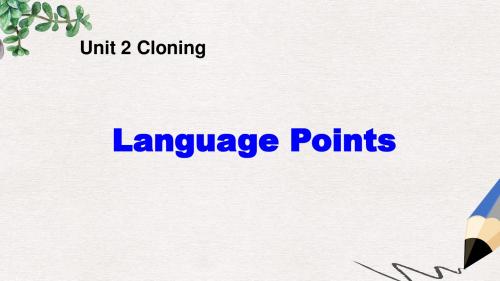人教版高中英语选修八Unit2《Cloning》
- 格式:pptx
- 大小:1.34 MB
- 文档页数:37


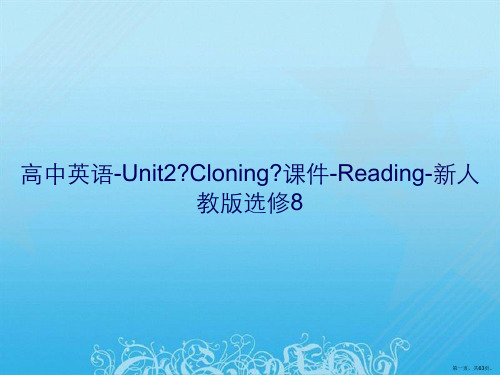
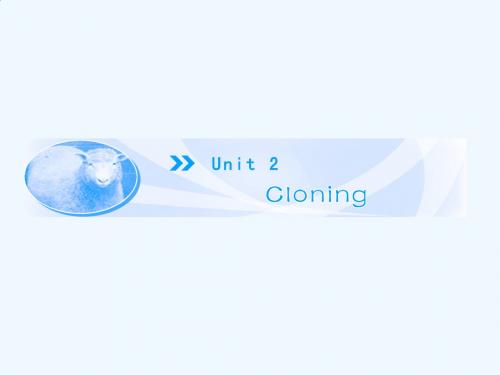

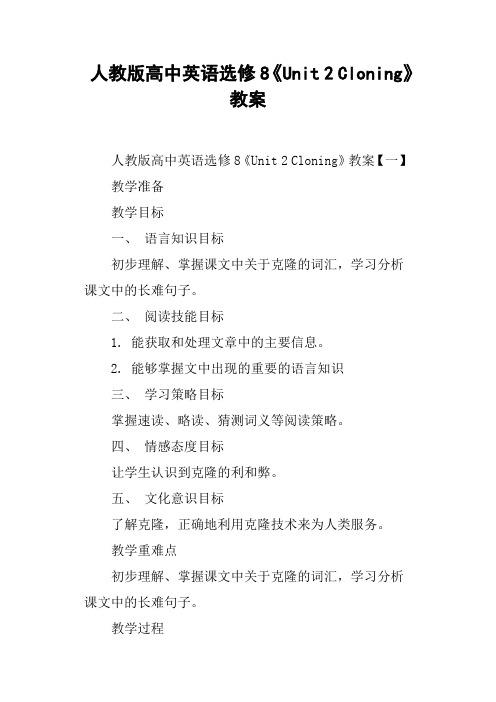
人教版高中英语选修8《Unit 2 Cloning》教案人教版高中英语选修8《Unit 2 Cloning》教案【一】教学准备教学目标一、语言知识目标初步理解、掌握课文中关于克隆的词汇,学习分析课文中的长难句子。
二、阅读技能目标1. 能获取和处理文章中的主要信息。
2. 能够掌握文中出现的重要的语言知识三、学习策略目标掌握速读、略读、猜测词义等阅读策略。
四、情感态度目标让学生认识到克隆的利和弊。
五、文化意识目标了解克隆,正确地利用克隆技术来为人类服务。
教学重难点初步理解、掌握课文中关于克隆的词汇,学习分析课文中的长难句子。
教学过程Step 1 Daily reportOne student comes to the front and gives a report about advantages and disadvantages of science and technology.Step 2 leading-inThe teacher shows some pictures and starts a discussion about cloning.Step 3 SkimmingTask 1: Whats the main idea of the passage? Task 2: Match the main idea with each paragraph Para 1: A. Peoples attitude towards cloning. Para 2: B. The problems of Dolly.Para 3: C. The impact of Dolly.Para 4: D. Two major uses and the procedure of cloning.Para 5: E. The definition(定义)of cloning.Step 4 ScanningTask 1. Look through Para 2 and answer the following questions.(1) What are the two major uses of cloning?(2) Which one is easier, to make plant clones or animal clones?Task 2. Look through Para 3 and fill in the chart. Task 3. Do the following translation and word guessing.(1). Translation:On the other hand, Dollys appearance raised a storm of objections and had a great impact on the media and public imagination.(2). The word controversial in paragraph 4 probably means_________.A. complicatedB. arguableC. importantD. valuableTask4. Do the following Tor F questions based on Paragraph 5.1. People feared some evil leaders might use cloning to reach their goal.2. All the research into cloning will be forbidden.3. Religious leaders are in favor of human cloning.Step 5 Enjoy beautiful sentences1. Cloning plants is straightforward while cloning animals is very complicated.2. At last the determination and patience of the scientists paid off.3. The fact that she seemed to develop normally was very encouraging.Step 6 Question and answerThis part is for students to find if they still have questions. If there is any, they can ask their classmates to help them.Step 7 QuizNote: This part is very challenging. In the picture there are five numbers. Students can choose their lucky number and answer questions. Most of the questions are based on what they have learned in class.Step 8. Test yourselfFill in the blank with proper words.Cloning is a way of _______ (make) an exact copy of another animal or plant. It has two major uses. One is _______ gardeners use it to produce plants. The ______ is that it is valuable for medical research on animals. ________, the process of cloning is difficult ___________ (undertake).The first successful clone, Dolly the sheep, made the whole _________ (science) world follow its progress, though it had ________ problems than the normal sheep. On the other hand, Dollys appearance _______ (raise) a storm of objections and had a great impact ______ the media and public imagination. Different people have different opinions on it. However, scientists still wonder ______ cloning will help or harm us and where it is leading us.Step 9 DebateTopic: Are you for or against cloning?课后小结HomeworkWrite a passage entitled My view on cloning.课后习题评测练习主要有两个。

unit2 CloningⅠ.阅读理解AThere are many ways in which human cloning is expected to benefit humans.Dr Richard Seed, one of the leading supporters of humancloning technology, suggests that it may someday be possible tocompletely change the aging process because of what we learn fromcloning.Scientists believe that they may be able to treat heart attackvictims by cloning their healthy heart cells and injecting them into the areas of the heart that have been damaged. Heart disease is the number one killer in the US and several other industrialised countries.There has been a breakthrough with human stem cells. Embryonic stem cells can be grown to produce organs to repair or replace damaged ones. Skin for burn victims, brain cells for the brain damaged, hearts, lungs, and kidneys could be produced. By combining this technology with human cloning technology, it may be possible to produce needed organs for suffering people that will be free of rejection by their immune systems. Conditions such as Alzheimer’s disease, Parkinson’s disease, heart failure, and other problems can be cured if human cloning and its technology are not banned.Though current treatments for infertility (不生育) are getting a fair amount of publicity in the news, they, in terms of percentages, are not very successful. Some data shows that current infertility treatments are less than 10 percent successful. Couples go through physically and emotionally painful procedures for a small chance of having children. Many couples run out of time and money without successfully having children. Human cloning could make it possible for many more infertile couples to have children than ever before possible.语篇解读:本文作者从几个方面介绍了克隆人技术给人类带来了利益。

Unit 2 CloningThe First Period warming upAims1. Talk about cloning2. Practice expressing and supporting an opinionContentsTask one: Looking and speakingIn pairs, look at the pictures and discuss which ones are natural clones and which ones are man-made. Explain how they differ.A.Dolly the sheepB. A strawberry plantC.TwinsD. Identical dogsTask two: Questions about cloningWhat is a clone?How is a clone produced?What benefits can humans gain from cloning?What problems may arise when humans are cloned?Task three: Free talkIn pairs, discuss what you understand about cloning, then list the questions you want to find out. Share your lists with one another.1. Should we clone human?2. Could cloning replace sex as the means of creating new human life?3. Could a parent clone a child who is dying of a terminal illness?The Second Period ReadingAims:1. Help the Ss to know how to describe cloning and how to catch the details of the text.2. Activate the Ss to show their opinions about the cloning and enable the Ss to write and article on this debate.Contents:Leading in by revision.Task one: Fast readingWhat is a clone?Show the following.1. Cloning means making a copy of an animal or a plant. (F. e xact… another)2. Gardeners can make a lot of money by cloning plants.(T.)3. Cloning animals is as complicated as cloning plants.(F. more than)4. Dolly the sheep was the first successful clone of a mammal. (T.)5. Natural clones happen in animals as well as in plants.(T)Task two: Careful readingRead the text again, try to answer the following questions and find out the main idea of each paragraph .Questions:1. What’s the main idea of the text?2. How many years did the sheep that donated the somatic cell most probably live?3. Why did the Cloning of Dolly the sheep succeed?4. What does the word ‘straightforward’ mean in the second paragraph?5. What is the writer’s attitude toward cloning in this passage?The main idea of each paragraph:Para. 1 Cloning is a way of making an copy of another animal and plant.Para. 2 Cloning has two major uses.Para. 3 The problems of Dolly.Para. 4 The effect of Dolly.Para. 5 It is forbidden to clone human being.Task three: Notes for debating: Should we use cloning?Argument for cloning:Cloning will be beneficial to humansWe could use cloning to cure illnesses.Arguments against cloning:healthy risks form mutation of genesemotional risksagainst naturerisk of abuse of the technologyCloned animals get ill and die quite young;The Third Period Language PointsAims:1. Enable the Ss to grasp the words of cloning.Get the Ss to master some useful expressions.Contents:1. differ v.1) “To be dissimilar or unlike in nature, quality, amount, or form”eg:Ambition differs from greed.2) “To be of a different opinion; disagree”eg:The critic differed with the author on several facts.2. exact adj. “Strictly and completely in accord with fact; not deviating from truth or reality”eg:an exact account; an exact replica; your exact words.3. commercial adj. 1) “Of or relating to commerce” 2) “Engaged in commerce’eg:a commercial loan; a commercial attaché; a commercial trucker.4. straightforward adj. 1) “honest’ 2) “easy to understand”eg: a ~ explanation; written in ~ language; a ~ problem in algebra5. procedure n.1) ‘A manner of proceeding; a way of performing or effecting something’eg:complained to the manager, and by this procedure got the money back.2) “A series of steps taken to accomplish an end”6. undertake v.1) “To take upon oneself; decide or agree to do”eg:undertake a task.2) “To pledge or commit (oneself) to’eg:undertake oneself to care for an elderly relative.7. breakthrough n.1) “An act of overcoming or penetrating an obstacle or restriction.”2) ‘A military offensive that penetrates an enemy's lines of defense’eg: a ~ in cancer research8. disturb v. “break the quiet, calm and peace’eg: She opened the door quietly so as not to disturb the sleeping boy.Don’t ~ the papers on my desk.9. arbitrary adj.1) “Determined by chance, whim, or impulse, and not by necessity, reason”eg:stopped at the first motel we passed, an arbitrary choice; arbitrary division of the group into halves.2) “Based on or subject to individual judgment or preference”eg:The diet imposes overall calorie limits, but daily menus are arbitrary.10. altogether adv.1) “Entirely; completely; utterly”eg:lost the TV picture altogether; an altogether new approach.2) “With all included or counted; all told”eg:There were altogether 20 people at the dinner.11. objection n. “The act of objecting”eg: He has a strong ~ to getting up early.~s to the plan will be listened to sympathetically.12. media n. 媒体eg: The running for president drew the ~’s attention.Now the press is an useful media.13. moral adj.1)“Of or concerned with the judgment of the goodness or badness”eg:moral scrutiny; a moral quandary.2) “Teaching or exhibiting goodness or correctness of character”eg:a moral lesson.14. accumulate v. “To gather or pile up”eg: By buying ten books every month, he soon ~d a library.Dust soon ~s if the room is not swept.15. forbid v.1) “To command (someone) not to do something”eg:I forbid you to go.2) “To command against the doing or use of (something); prohibit”eg:forbid smoking on trains.The Forth period Learning about language and Using languageAims:Let the Ss know more about the cloning.Improve the students’ listening, reading and writing ability.Contents:Task one: gap fillingplete the sentences using suitable words or phrases from the prevision sections.2.Rewrite the sentences using words of similar meaning to replace the underlined words.e the words and phrases below to fill in the passage.Task two: reading and discussing1.Read the passage and answer the questions.2.In pairs, discuss which extinct animals described below (which died out less than 10,000 yearsago) are worth restoring by means of cloning.a. Auroch (1627)b. Dodo bird (1755)c. Great auk (1844)d. Quagga (1883)Task three: listening and writing1.Read the statements before listening. Tick those that you hear.2.Listen to the tape again and then work with a partner to fill in the chart on page 17.3.Whose idea do you agree with according to the listening materials? Get ready to write acomposition. Think about the reasons for your point of view. Use your own ideas as well as those in the text.。


高中英语学习材料madeofjingetiejiunit2 CloningⅠ.阅读理解AThere are many ways in which human cloning is expected to benefit humans.Dr Richard Seed, one of the leading supporters of humancloning technology, suggests that it may someday be possible tocompletely change the aging process because of what we learn fromcloning.Scientists believe that they may be able to treat heart attackvictims by cloning their healthy heart cells and injecting them into the areas of the heart that have been damaged. Heart disease is the number one killer in the US and several other industrialised countries.There has been a breakthrough with human stem cells. Embryonic stem cells can be grown to produce organs to repair or replace damaged ones. Skin for burn victims, brain cells for the brain damaged, hearts, lungs, and kidneys could be produced. By combining this technology with human cloning technology, it may be possible to produce needed organs for suffering people that will be free of rejection by their immune systems. Conditions such as Alzheimer’s disease, Parkinson’s disease, heart failure, and other problems can be cured if human cloning and its technology are not banned.Though current treatments for infertility (不生育) are getting a fair amount of publicity in the news, they, in terms of percentages, are not very successful. Some data shows that current infertility treatments are less than 10 percent successful. Couples go through physically and emotionally painful procedures for a small chance of having children. Many couples run out of time and money without successfully having children. Human cloning could make it possible for many more infertile couples to have children than ever before possible.语篇解读:本文作者从几个方面介绍了克隆人技术给人类带来了利益。

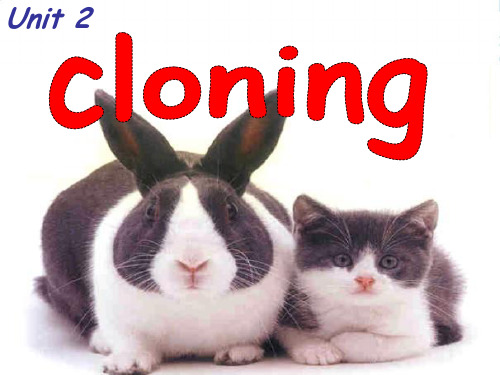

人教版高中英语选修八 Unit2 Cloning-词汇篇(教师版)第3讲Cloning 词汇篇____________________________________________ __________________________________________________________________________________ ______________________________________1.熟练掌握重点单词及其用法;能够熟练运用重点短语和句型。
一. 重点词汇1. differ v. 不同;相异;使.......相异常用结构:A differs fromB in ...A与B在......方面不同A differs withB about/on/over... A与B就......意见相左Their house differs from mine in having no garage. 他们的房子与我的不同,区别在于他们的没有车库。
The two sides still differ with each other over the question of pay.双方在报酬的问题上仍各持己见。
联想拓展difference n. 不同之处different adj. 不同的make a difference to 对......产生变化;对什么有n. 物体;目标object to sb./sth. 不赞成某人/某事object to doing sth. 反对做某事object that ... 反对......No one objected to the plan.没有人反对这项计划。
We object to being treated like this.我们反对受到这样的待遇。
Why do some people object to human cloning? 为什么一些人反对克隆人类呢?The building is the main object of his interest.他最感兴趣的是这栋建筑物。

Unit 2 Working the land(耕作土地,在田间耕作) 一.单词考点Section A Warming-up,Reading&Comprehending1.struggle的用法⑴作vi.时,“斗争;拼搏;努力”搭配:for...为……而斗争struggle against...与……作斗争with...与……并肩作战to do sth....努力做某事eg:Millions of people are struggling for survival.⑵作n.时,[C]“斗争;奋斗;努力”搭配:with sb.for sth.与某人一起支持某事的斗争a struggle with sb.against sth.与某人一起反对某事的斗争with sb.to do sth.与某人一起努力做某事between A and B A与B之间的斗争eg:It is a struggle between good and evil.2.hunger的用法⑴作n时,[U]“饥饿”[C]“渴望,欲望”搭配:with hunger因为/由于饥饿die of hunger死于饥饿have a (strong) hunger for sth.(强烈)渴望某物eg:She has a strong hunger for knowledge.⑵作vi时,“渴求;渴望得到”搭配:hunger for/after...渴望得到hunger to do sth.渴望做某事eg:We all hunger for others’ understanding.3.disturbingadj 引起烦恼的;令人不安的—disturbedadj(感到)心烦意乱的;烦恼的—disturbvt使不安eg:What he said was disturbing.4.expand v “使变大;伸展”的用法搭配:expand...into...把……扩展/发展成……expand into...扩展/膨胀成……expand (up)on阐述,详谈eg:①Tom is expanding his story into a novel.②Expand this sentence into a paragraph.区别:expand,extend,enlarge,stretch⑴expand指范围、体积的扩大,尤指向四面八方扩大、扩张。
